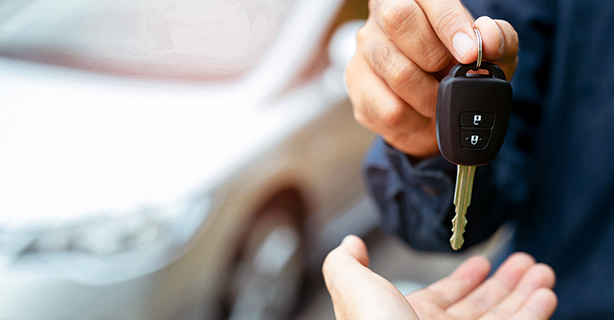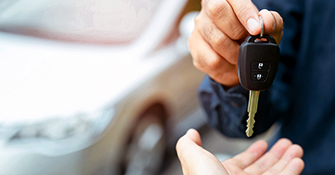Non-owner car insurance: What is it and who needs it?
What is non-owner car insurance?
Non-owner car insurance can help protect you by providing liability coverage (for others' injuries and property damage) if you cause an accident while driving a covered vehicle you don't own.
Purchasing non-owner car insurance can be a good option for frequent car borrowers, as this secondary coverage can help pay for damages above and beyond what might be covered by the car owner's primary insurance.

Call us at 855-664-2010 to start a car insurance quote.
Do I need non-owner car insurance?
You don’t own a vehicle, but you plan on getting behind the wheel from time to time. If that’s the case, a non-owner policy can help protect you. Here are some typical scenarios:
You borrow cars often
If you plan to drive someone else’s car, you’ll want to have basic liability coverage in place. In fact, depending on where you live, basic liability coverage might be mandatory. Non-owner car insurance helps ensure those requirements are met.You’re in between cars
Let’s say you’re in between cars or you’re not in a financial position to buy a car right now. While you could cancel your previous auto insurance policy, swapping it for a cheaper non-owner car insurance policy keeps you under continuous coverage, helping you avoid lapses in coverage and potentially saving you money in the long run.You need to provide proof of insurance
If your state requires insurance coverage for drivers who don’t own a car but have incurred major violations such as DUI or DWI, a non-owner policy may be an affordable, responsible way to satisfy that requirement.
Who doesn’t need non-owners car insurance?
You live in the same house as someone who owns a car
If you live with someone who already owns a vehicle, you won’t be able to purchase named non-owner car insurance to cover that vehicle. The person who owns the vehicle needs to list all members of the household—including you—on their car insurance as secondary drivers.
You primarily use public transportation
Buses, trains, taxis, rideshare programs, and even bike rentals can make vehicle ownership unnecessary for many of us. If you use these services most of the time, you likely don’t need a non-owners car insurance policy.
What does non-owner car insurance cover?
Required coverages for your state
With a non-owners car insurance policy, you meet your state’s minimum insurance requirements for liability insurance, which covers:
Injuries to others in an accident you cause
If you’re at fault in a covered accident and motorists in the other vehicle are injured, bodily injury liability helps cover the costs related to their injuries, up to the amounts established on your policy.
Property damage to others’ vehicles in an accident you cause
Property damage liability helps pay for damage you cause to another person’s property, including their vehicle, in a covered accident.
Optional non-owners coverage
Uninsured/underinsured motorist coverage
Roughly one in eight U.S. motorists is uninsured,* and even more don’t have sufficient coverage. To help protect you if you’re involved in an accident with one of these drivers, you can add uninsured and underinsured motorists coverages to your non-owners policy. Without these coverages, you could be stuck paying these expenses out of pocket.Personal injury protection
Personal injury protection (PIP) can help pay for medical expenses you and your passengers face following an accident, regardless of who was at fault. Just keep in mind PIP coverage isn’t available in all states.
What non-owners auto insurance doesn’t cover
Non-owner car insurance doesn’t cover damages to the vehicle you’re driving, and it generally doesn’t include coverage for your property or injuries you suffer in an accident.

Give us a call at 855-664-2010 to get started.
How much is non-owner car insurance?
A non-owner auto insurance policy can be a cheaper alternative to traditional car insurance. Just keep in mind that cheap car insurance depends on several factors, including:
Your age
Your ZIP code
Your driving history
How much coverage you want to purchase
Your car insurance agent or company can break it all down for you. You can also work with your agent to determine whether you qualify for any money-saving discounts or find additional ways to get cheaper car insurance.
How to buy non-owners car insurance
To get a non-owner policy, work with your insurance agent or insurance provider. You typically can’t select this option during the online quote process.
You’ll want to gather some information to prepare for this discussion. Have your driver license and payment method accessible, along with information on your driving history and a general idea of how much coverage you want to purchase.
Questions about non-owner car insurance coverage? Give us a call at 855-450-1630 to speak to one of our knowledgeable agents.
Non-owner car insurance FAQs
Can you get car insurance without a car?
Yes—in fact, that’s exactly the scenario non-owner car insurance is designed for. This coverage can provide significant value if you don't own a car but occasionally drive vehicles owned by people who don’t share a household with you. It can also be a cost-effective way to stay compliant with a financial responsibility filing, such as an SR-22, if needed. Call us today at 855-450-1630 for a quote.
Besides liability insurance, what else does non-owners car insurance cover?
You may be able to add optional uninsured motorist (UM) and underinsured motorist (UIM) coverages to your non-owners car insurance policy. These coverages can help protect you if you’re involved in an accident caused by a motorist who either isn’t insured or who doesn’t have enough coverage to pay for the resulting expenses.
Additionally, some states allow you to add personal injury protection (PIP) along with the other auto insurance coverages on our policy, which can help pay for medical expenses you and your passengers face following an accident.
What is a non-owners insurance policy?
Non-owners auto insurance is a type of car insurance that may make sense for you if you don’t own a vehicle and don’t live with someone who owns a vehicle, but you borrow cars frequently or drive other people’s cars from time to time. Your non-owners policy helps protect you with liability coverage if you’re involved in a covered accident while driving a vehicle you don’t own.
Can you drive with non-owners car insurance?
Yes—just be aware your non-owners auto insurance policy doesn’t include collision or comprehensive insurance, so you’ll likely be responsible for any damages to the vehicle you’re driving if you’re in an accident.
Where can I get non-owner car insurance?
Assuming non-owner car insurance is available in your state, you’ll work with your insurance agent or directly with your insurance provider to set up your policy. Dairyland offers this coverage in states where it’s available—call us at 855-450-1630 today for an affordable non-owners insurance quote.
There are serious risks associated with driving without insurance—whether you drive your own vehicle or someone else’s. We explain how these risks can impact yourself and other drivers.
Letting your auto insurance lapse can be costly in the long term, even if you don’t own a vehicle right now. Review several factors to consider if you’re thinking of letting your car insurance coverage lapse.
Not sure what happens when you get a DUI? Find out how it can impact your insurance, driver license, and finances.
From bodily injury liability to collision and comprehensive, learn about the car insurance coverages that make up your policy.
If you’ve been told you need SR-22 insurance, you probably have questions. Don’t worry—we have answers.










